[Dec 2007, Volume 4 Quarterly Issue] Pdf File size - The IIPM Think ...
[Dec 2007, Volume 4 Quarterly Issue] Pdf File size - The IIPM Think ...
[Dec 2007, Volume 4 Quarterly Issue] Pdf File size - The IIPM Think ...
Create successful ePaper yourself
Turn your PDF publications into a flip-book with our unique Google optimized e-Paper software.
Mrutyunjay Dash<br />
Professor of Economics and<br />
Business Environment,<br />
Asian School of Business<br />
Management,Bhubaneswar<br />
Tenancy Reforms in Orissa:<br />
A Critical Perspective<br />
"He who owns the soil, owns<br />
up to the sky."<br />
- Douglas Gerrold<br />
I. Introduction<br />
Orissa is primarily an agrarian economy.<br />
Agriculture is the state’s dominant sector<br />
with a contribution of nearly 28.13 percent<br />
to net state domestic product during 2001-<br />
2002. Agriculture alone provides direct<br />
and indirect employment to around 65<br />
percent of the total workforce of the state<br />
as per 2001 provisional Census. Nearly 87<br />
percent of total population lives in rural<br />
areas. It has remained as an agriculturally<br />
backward state of India with high incidence<br />
of concealed tenancy. Though tenancy<br />
is legally prohibited in the state, it is<br />
observed in large scale across the length<br />
and breadth of Orissa. <strong>The</strong> Orissa Land<br />
Reforms Committee, 1980, has brought to<br />
the limelight the existence of a vast number<br />
of tenants, mostly unrecorded sharecroppers,<br />
in the rural areas of Orissa. Neither<br />
these tenants have opted for the legal provision<br />
of applying to the revenue officers<br />
for obtaining ryoti right nor the latter, empowered<br />
to initiate action to confer ownership<br />
rights on tenants, have shown any<br />
interest in this regard. Adam Smith (1969)<br />
has rightly remarked that a person, who<br />
has no property rights over land, can have<br />
no other interest except eating as much<br />
and labouring as little as possible, since<br />
the fruit of his hard labour is expropriated<br />
by the proprietor. Psychological feelings of<br />
non-ownership coupled with insecurity<br />
kill their efficiency, enthusiasm and physical<br />
ability. Besides, social distinctions between<br />
landowner and agricultural labourer<br />
deaden the interest and the zeal of the<br />
latter. This is why land reforms in general<br />
and tenurial reforms in particular have to<br />
be assigned the top-most priority in bringing<br />
about the transformation of agricultural<br />
sector so as to make it vibrant, dynamic<br />
and more productive. However, lack<br />
of proper implementation of tenancy reform<br />
measures, prevalence of large scale<br />
concealed tenancy with oral leases, absence<br />
of rent receipts, ignorance of the<br />
legal provisions of tenancy legislations,<br />
built-in legal loopholes and above all, lack<br />
of political will can be attributed for the<br />
results being not so encouraging. In this<br />
paper an attempt has been made to give a<br />
182 THE <strong>IIPM</strong> THINK TANK


![[Dec 2007, Volume 4 Quarterly Issue] Pdf File size - The IIPM Think ...](https://img.yumpu.com/29766298/181/500x640/dec-2007-volume-4-quarterly-issue-pdf-file-size-the-iipm-think-.jpg)
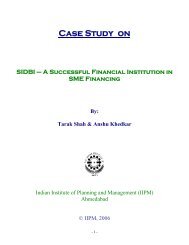
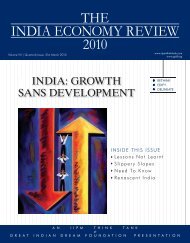
![[Feb 2008, Volume V Annual Issue] Pdf File size - The IIPM Think Tank](https://img.yumpu.com/43961117/1/190x245/feb-2008-volume-v-annual-issue-pdf-file-size-the-iipm-think-tank.jpg?quality=85)
![[June 2008, Volume V Quarterly Issue] Pdf File size - The IIPM Think ...](https://img.yumpu.com/41693247/1/190x245/june-2008-volume-v-quarterly-issue-pdf-file-size-the-iipm-think-.jpg?quality=85)
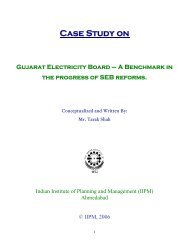

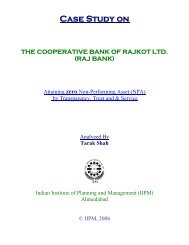

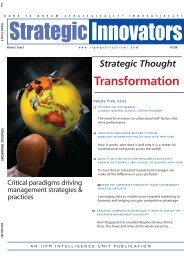
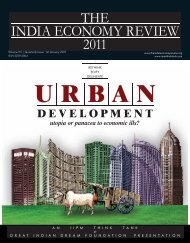
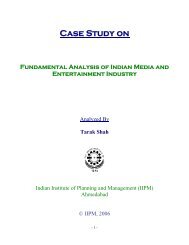
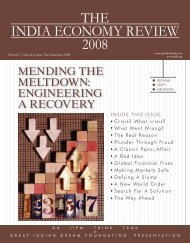
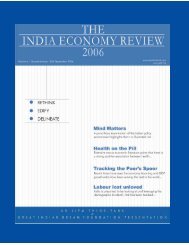
![[Volume VI | Quarterly Issue: 31st May 2009] Pdf File size](https://img.yumpu.com/27796051/1/190x245/volume-vi-quarterly-issue-31st-may-2009-pdf-file-size.jpg?quality=85)